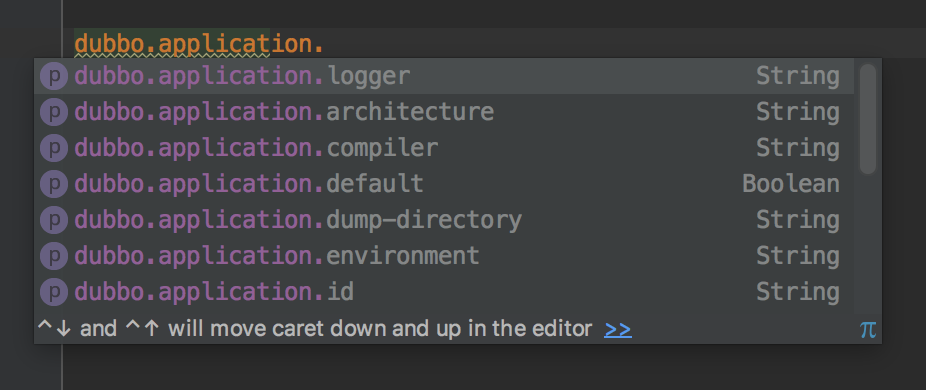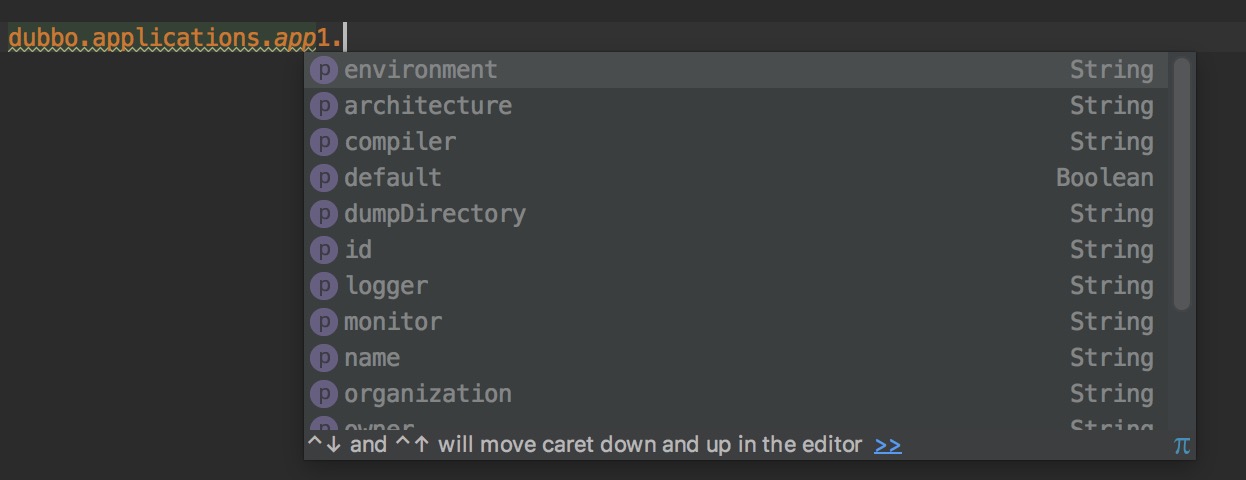Dubbo Spring Boot Project
Dubbo Spring Boot Project makes it easy to create Spring Boot application using Dubbo as RPC Framework. What's more , it aslo provides production-ready features (e.g.security, health checks, externalized configuration).
Dubbo |ˈdʌbəʊ| is a high-performance, java based RPC framework open-sourced by Alibaba. As in many RPC systems, dubbo is based around the idea of defining a service, specifying the methods that can be called remotely with their parameters and return types. On the server side, the server implements this interface and runs a dubbo server to handle client calls. On the client side, the client has a stub that provides the same methods as the server.
Getting Started
If you don't know about Dubbo , please take a few minutes to learn http://dubbo.io/ . After that you could dive deep into dubbo user guide.
Usually , There are two usage scenarios for Dubbo applications , one is Dubbo service(s) provider , another is Dubbo service(s) consumer, thus let's get a quick start on them.
First of all , we suppose an interface as Dubbo RPC API that a service provider exports and a service client consumes :
public interface DemoService {
String sayHello(String name);
}Dubbo service(s) provider
Service Provider implements DemoService :
@Service(
version = "1.0.0",
application = "${dubbo.application.id}",
protocol = "${dubbo.protocol.id}",
registry = "${dubbo.registry.id}"
)
public class DefaultDemoService implements DemoService {
public String sayHello(String name) {
return "Hello, " + name + " (from Spring Boot)";
}
}then , provides a bootstrap class :
@SpringBootApplication
public class DubboProviderDemo {
public static void main(String[] args) {
SpringApplication.run(DubboProviderDemo.class,args);
}
}last , configures application.properties :
# Spring boot application
spring.application.name = dubbo-provider-demo
server.port = 9090
management.port = 9091
# Base packages to scan Dubbo Components (e.g @Service , @Reference)
dubbo.scan.basePackages = com.alibaba.boot.dubbo.demo.provider.service
# Dubbo Config properties
## ApplicationConfig Bean
dubbo.application.id = dubbo-provider-demo
dubbo.application.name = dubbo-provider-demo
## ProtocolConfig Bean
dubbo.protocol.id = dubbo
dubbo.protocol.name = dubbo
dubbo.protocol.port = 12345
## RegistryConfig Bean
dubbo.registry.id = my-registry
dubbo.registry.address = N/ADefaultDemoService's placeholders( ${dubbo.application.id}, ${dubbo.protocol.id}, ${dubbo.registry.id} ) sources from application.properties.
More details , please refer to Dubbo Provider Sample.
Dubbo service(s) consumer
Service consumer requires Spring Beans to reference DemoService :
@RestController
public class DemoConsumerController {
@Reference(version = "1.0.0",
application = "${dubbo.application.id}",
url = "dubbo://localhost:12345")
private DemoService demoService;
@RequestMapping("/sayHello")
public String sayHello(@RequestParam String name) {
return demoService.sayHello(name);
}
}then , also provide a bootstrap class :
@SpringBootApplication(scanBasePackages = "com.alibaba.boot.dubbo.demo.consumer.controller")
public class DubboConsumerDemo {
public static void main(String[] args) {
SpringApplication.run(DubboConsumerDemo.class,args);
}
}last , configures application.properties :
# Spring boot application
spring.application.name = dubbo-consumer-demo
server.port = 8080
management.port = 8081
# Dubbo Config properties
## ApplicationConfig Bean
dubbo.application.id = dubbo-consumer-demo
dubbo.application.name = dubbo-consumer-demo
## ProtocolConfig Bean
dubbo.protocol.id = dubbo
dubbo.protocol.name = dubbo
dubbo.protocol.port = 12345If DubboProviderDemo works well , please mark sure Dubbo service(s) is active.
More details , please refer to Dubbo Consumer Sample
Externalized Configuration
Externalized Configuration is a core feature of Spring Boot , Dubbo Spring Boot not only supports it definitely , but also inherits Dubbo's Externalized Configuration, thus it provides single and multiple Dubbo's *Config Bindings from PropertySources , and "dubbo." is a common prefix of property name.
If you'd like to learn more , please read Dubbo Externalized Configuration(Chinese).
Single Dubbo Config Bean Bindings
In most use scenarios , "Single Dubbo Config Bean Bindings" is enough , because a Dubbo application only requires single Bean of *Config (e.g ApplicationConfig). You add properties in application.properties to configure Dubbo's *Config Beans that you want , be like this :
dubbo.application.name = foo
dubbo.application.owner = bar
dubbo.registry.address = 10.20.153.10:9090There are two Spring Beans will be initialized when Spring ApplicatonContext is ready, their Bean types are ApplicationConfig and RegistryConfig.
Getting Single Dubbo Config Bean
If application requires current ApplicationConfig Bean in somewhere , you can get it from Spring BeanFactory as those code :
BeanFactory beanFactory = ....
ApplicationConfig applicationConfig = beanFactory.getBean(ApplicationConfig.class)or inject it :
@Autowired
private ApplicationConfig application;Identifying Single Dubbo Config Bean
If you'd like to identify this ApplicationConfig Bean , you could add "id" property:
dubbo.application.id = application-bean-idMapping Single Dubbo Config Bean
The whole Properties Mapping of "Single Dubbo Config Bean Bindings" lists below :
Dubbo *Config Type |
The prefix of property name for Single Bindings |
|---|---|
ProtocolConfig |
dubbo.protocol |
ApplicationConfig |
dubbo.application |
ModuleConfig |
dubbo.module |
RegistryConfig |
dubbo.registry |
MonitorConfig |
dubbo.monitor |
ProviderConfig |
dubbo.provider |
ConsumerConfig |
dubbo.consumer |
An example properties :
# Single Dubbo Config Bindings
## ApplicationConfig
dubbo.application.id = applicationBean
dubbo.application.name = dubbo-demo-application
## ModuleConfig
dubbo.module.id = moduleBean
dubbo.module.name = dubbo-demo-module
## RegistryConfig
dubbo.registry.address = zookeeper://192.168.99.100:32770
## ProtocolConfig
dubbo.protocol.name = dubbo
dubbo.protocol.port = 20880
## MonitorConfig
dubbo.monitor.address = zookeeper://127.0.0.1:32770
## ProviderConfig
dubbo.provider.host = 127.0.0.1
## ConsumerConfig
dubbo.consumer.client = nettyMultiple Dubbo Config Bean Bindings
In contrast , "Multiple Dubbo Config Bean Bindings" means Externalized Configuration will be used to configure multiple Dubbo *Config Beans.
Getting Multiple Dubbo Config Bean
The whole Properties Mapping of "Multiple Dubbo Config Bean Bindings" lists below :
Dubbo *Config Type |
The prefix of property name for Multiple Bindings |
|---|---|
ProtocolConfig |
dubbo.protocols |
ApplicationConfig |
dubbo.applications |
ModuleConfig |
dubbo.modules |
RegistryConfig |
dubbo.registries |
MonitorConfig |
dubbo.monitors |
ProviderConfig |
dubbo.providers |
ConsumerConfig |
dubbo.consumers |
Identifying Multiple Dubbo Config Bean
There is a different wa to identify Multiple Dubbo Config Bean , the configuration pattern is like this :
${config-property-prefix}.${config-bean-id}.${property-name} = some value , let's explain those placehoders :
${config-property-prefix}: The The prefix of property name for Multiple Bindings , e.g.dubbo.protocols,dubbo.applicationsand so on.${config-bean-id}: The bean id of Dubbo's*Config${property-name}: The property name of*Config
An example properties :
dubbo.applications.application1.name = dubbo-demo-application
dubbo.applications.application2.name = dubbo-demo-application2
dubbo.modules.module1.name = dubbo-demo-module
dubbo.registries.registry1.address = zookeeper://192.168.99.100:32770
dubbo.protocols.protocol1.name = dubbo
dubbo.protocols.protocol1.port = 20880
dubbo.monitors.monitor1.address = zookeeper://127.0.0.1:32770
dubbo.providers.provider1.host = 127.0.0.1
dubbo.consumers.consumer1.client = nettyGetting help
Having trouble with Dubbo Spring Boot? We’d like to help!
- If you are upgrading, read the release notes for upgrade instructions and "new and noteworthy" features.
- Ask a question - You can join ours google groups , or subscribe Dubbo User Mailling List.
- Report bugs at github.com/dubbo/dubbo-spring-boot-project/issues.
Building from Source
If you want to try out thr latest features of Dubbo Spring Boot , it can be easily built with the maven wrapper. Your JDK is 1.7 or above.
$ ./mvnw clean install
Getting From Maven Repository
Important Notes: Work in-process , coming soon...
<dependency>
<groupId>com.alibaba.boot</groupId>
<artifactId>dubbo-spring-boot-starter</artifactId>
<version>1.0.0-SNAPSHOT</version>
</dependency>Modules
There are some modules in Dubbo Spring Boot Project , let's take a look at below overview :
dubbo-spring-boot-parent
The main usage of dubbo-spring-boot-parent is providing dependencies management for other modules.
dubbo-spring-boot-autoconfigure
Since 2.5.7 , Dubbo totally supports Annotation-Driven , core Dubbo's components that are registered and initialized in Spring application context , including exterialized configuration features. However , those features need to trigger in manual configuration , e.g @DubboComponentScan , @EnableDubboConfig or @EnableDubbo.
dubbo-spring-boot-autoconfigure uses Spring Boot's @EnableAutoConfiguration which helps core Dubbo's components to be auto-configured by DubboAutoConfiguration. It reduces code, eliminates XML configuration.
If you used advanced IDE tools , for instance Jetbrains IDEA Ultimate develops Dubbo Spring Boot application, it will popup the tips of Dubbo Configuration Bindings in application.properties :
dubbo-spring-boot-actuator
dubbo-spring-boot-actuator provides production-ready features (e.g.security, health checks, externalized configuration).
Endpoints
Dubbo Spring Boot providers actuator endpoint dubbo , however it is disable. If you'd like to enable it , please add property into application.properties :
# Dubbo Endpoint (default status is disable)
endpoints.dubbo.enabled = trueActuator endpoint dubbo supports Spring Web MVC Endpoints :
| URI | HTTP Method | Description | Content Type |
|---|---|---|---|
/dubbo |
GET |
Exposes Dubbo's meta data | application/json |
/dubbo/properties |
GET |
Exposes all Dubbo's Properties | application/json |
/dubbo/services |
GET |
Exposes all Dubbo's ServiceBean |
application/json |
/dubbo/references |
GET |
Exposes all Dubbo's ReferenceBean |
application/json |
/dubbo/configs |
GET |
Exposes all Dubbo's *Config |
application/json |
/dubbo/shutdown |
POST |
Shutdown Dubbo services | application/json |
Endpoint : /dubbo
/dubbo exposes Dubbo's meta data :
{
"timestamp": 1516623290166,
"versions": {
"dubbo-spring-boot": "1.0.0"
"dubbo": "2.5.9"
},
"urls": {
"dubbo": "https://github.com/alibaba/dubbo",
"google-group": "http://groups.google.com/group/dubbo",
"github": "https://github.com/dubbo/dubbo-spring-boot-project",
"issues": "https://github.com/dubbo/dubbo-spring-boot-project/issues",
"git": "https://github.com/dubbo/dubbo-spring-boot-project.git"
},
"endpoints": {
"shutdown": "/shutdown",
"configs": "/configs",
"services": "/services",
"references": "/references",
"properties": "/properties"
}
}Endpoint : /dubbo/properties
/dubbo/properties exposes all Dubbo's Properties from Spring Boot Externalized Configuration (a.k.a PropertySources) :
{
"dubbo.application.id": "dubbo-provider-demo",
"dubbo.application.name": "dubbo-provider-demo",
"dubbo.application.qos-enable": "false",
"dubbo.application.qos-port": "33333",
"dubbo.protocol.id": "dubbo",
"dubbo.protocol.name": "dubbo",
"dubbo.protocol.port": "12345",
"dubbo.registry.address": "N/A",
"dubbo.registry.id": "my-registry",
"dubbo.scan.basePackages": "com.alibaba.boot.dubbo.demo.provider.service"
}The structure of JSON is simple Key-Value format , the key is property name as and the value is property value.
Endpoint : /dubbo/services
/dubbo/services exposes all Dubbo's ServiceBean that are declared via <dubbo:service/> or @Service present in Spring ApplicationContext :
{
"ServiceBean@com.alibaba.dubbo.demo.DemoService#defaultDemoService": {
"accesslog": null,
"actives": null,
"cache": null,
"callbacks": null,
"class": "com.alibaba.dubbo.config.spring.ServiceBean",
"cluster": null,
"connections": null,
"delay": null,
"document": null,
"executes": null,
"export": null,
"exported": true,
"filter": "",
"generic": "false",
"group": null,
"id": "com.alibaba.dubbo.demo.DemoService",
"interface": "com.alibaba.dubbo.demo.DemoService",
"interfaceClass": "com.alibaba.dubbo.demo.DemoService",
"layer": null,
"listener": "",
"loadbalance": null,
"local": null,
"merger": null,
"mock": null,
"onconnect": null,
"ondisconnect": null,
"owner": null,
"path": "com.alibaba.dubbo.demo.DemoService",
"proxy": null,
"retries": null,
"scope": null,
"sent": null,
"stub": null,
"timeout": null,
"token": null,
"unexported": false,
"uniqueServiceName": "com.alibaba.dubbo.demo.DemoService:1.0.0",
"validation": null,
"version": "1.0.0",
"warmup": null,
"weight": null,
"serviceClass": "com.alibaba.boot.dubbo.demo.provider.service.DefaultDemoService"
}
}The key is the Bean name of ServiceBean , ServiceBean's properties compose value.
Endpoint : /dubbo/references
/dubbo/references exposes all Dubbo's ReferenceBean that are declared via @Reference annotating on Field or Method :
{
"private com.alibaba.dubbo.demo.DemoService com.alibaba.boot.dubbo.demo.consumer.controller.DemoConsumerController.demoService": {
"actives": null,
"cache": null,
"callbacks": null,
"class": "com.alibaba.dubbo.config.spring.ReferenceBean",
"client": null,
"cluster": null,
"connections": null,
"filter": "",
"generic": null,
"group": null,
"id": "com.alibaba.dubbo.demo.DemoService",
"interface": "com.alibaba.dubbo.demo.DemoService",
"interfaceClass": "com.alibaba.dubbo.demo.DemoService",
"layer": null,
"lazy": null,
"listener": "",
"loadbalance": null,
"local": null,
"merger": null,
"mock": null,
"objectType": "com.alibaba.dubbo.demo.DemoService",
"onconnect": null,
"ondisconnect": null,
"owner": null,
"protocol": null,
"proxy": null,
"reconnect": null,
"retries": null,
"scope": null,
"sent": null,
"singleton": true,
"sticky": null,
"stub": null,
"stubevent": null,
"timeout": null,
"uniqueServiceName": "com.alibaba.dubbo.demo.DemoService:1.0.0",
"url": "dubbo://localhost:12345",
"validation": null,
"version": "1.0.0",
"invoker": {
"class": "com.alibaba.dubbo.common.bytecode.proxy0"
}
}
}The key is the string presentation of @Reference Field or Method , ReferenceBean's properties compose value.
Endpoint : /dubbo/configs
/dubbo/configs exposes all Dubbo's *Config :
{
"ApplicationConfig": {
"dubbo-consumer-demo": {
"architecture": null,
"class": "com.alibaba.dubbo.config.ApplicationConfig",
"compiler": null,
"dumpDirectory": null,
"environment": null,
"id": "dubbo-consumer-demo",
"logger": null,
"name": "dubbo-consumer-demo",
"organization": null,
"owner": null,
"version": null
}
},
"ConsumerConfig": {
},
"MethodConfig": {
},
"ModuleConfig": {
},
"MonitorConfig": {
},
"ProtocolConfig": {
"dubbo": {
"accepts": null,
"accesslog": null,
"buffer": null,
"charset": null,
"class": "com.alibaba.dubbo.config.ProtocolConfig",
"client": null,
"codec": null,
"contextpath": null,
"dispatcher": null,
"dispather": null,
"exchanger": null,
"heartbeat": null,
"host": null,
"id": "dubbo",
"iothreads": null,
"name": "dubbo",
"networker": null,
"path": null,
"payload": null,
"port": 12345,
"prompt": null,
"queues": null,
"serialization": null,
"server": null,
"status": null,
"telnet": null,
"threadpool": null,
"threads": null,
"transporter": null
}
},
"ProviderConfig": {
},
"ReferenceConfig": {
},
"RegistryConfig": {
},
"ServiceConfig": {
}
}The key is the simple name of Dubbo *Config Class , the value is*Config Beans' Name-Properties Map.
Endpoint : /dubbo/shutdown
/dubbo/shutdown shutdowns Dubbo's components including registries, protocols, services and references :
{
"shutdown.count": {
"registries": 0,
"protocols": 1,
"services": 0,
"references": 1
}
}"shutdown.count" means the count of shutdown of Dubbo's components , and the value indicates how many components have been shutdown.
dubbo-spring-boot-starter
dubbo-spring-boot-starter is a standard Spring Boot Starter, which contains dubbo-spring-boot-autoconfigure and dubbo-spring-boot-actuator. It will be imported into your application directly.
dubbo-spring-boot-samples
The samples project of Dubbo Spring Boot that includes two parts:

